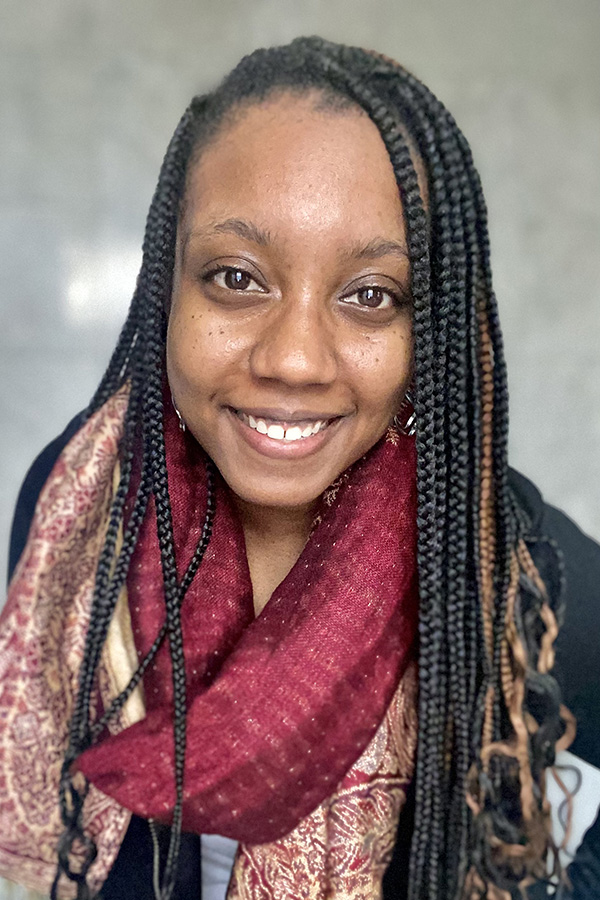Simone Douglas-Green knows exactly the kind of environment she’ll work in when she starts her first job as a faculty member. After all, the former Ph.D. student in the Wallace H. Coulter Department of Biomedical Engineering is coming home.
A year into her postdoctoral work, Douglas-Green has accepted an offer to join the Coulter BME faculty starting in early 2024 — a long lead, but a reflection of her talent and part of an effort by the Department to welcome back promising young scholars who earned a doctorate in the joint Emory University-Georgia Tech program.
“I want to solve complex problems, and the BME program at Georgia Tech and Emory is the supportive environment where I can pursue my research vision and take risks,” said Douglas-Green, who finished her Ph.D. in 2020. “Coulter BME has a reputation for recruiting and training fantastic students, and it’s great to see the Department welcoming back former trainees as faculty. I think it’s a testament to the strength of the education and research program.”
Douglas-Green currently is a postdoc in Paula Hammond’s lab at the Massachusetts Institute of Technology, building her research program and working on a project related to osteoarthritis. Interim Wallace H. Coulter Department Chair Machelle Pardue said making this early mutual commitment helps build the future of the Department — and the field.
“We’re proud to welcome Simone to our faculty in the coming years, because we are confident about the impact she will have,” Pardue said. “This early commitment allows us to invest in talented scholars and build our next generation of innovative and impactful researchers.”
Douglas-Green’s dissertation research with Professor Manu Platt focused on cysteine cathepsins’ role in making or breaking fibrin, an essential blood-clotting protein and a biomaterial commonly used in tissue engineering. Her work examined both the abnormal blood clotting in sickle cell disease and remodeling engineered microvascular networks.
In her postdoctoral work, Douglas-Green is focused on drug-delivery via nanocarriers. She’s working to understand protein “coronas” — collections of proteins and other molecules in the body that can attach and become a thin film on the surface of nanoparticles when they come in contact with biological fluids.
“When this occurs, it can alter the physical and/or chemical properties of the nanoparticle, impacting targeting and transport properties,” Douglas-Green said. “Characterizing the protein corona on small nanoparticles — 4-6 nanometers in size — requires some novel techniques, but I also aim to leverage protein interactions to systematically design these nanocarriers.”
Douglas-Green credited the late Bob Nerem, founding director of the Petit Institute for Bioengineering and Bioscience at Georgia Tech, for encouraging her interest in an academic career — and particularly starting her career in the Coulter Department.
“Pulling a faculty application together, especially developing a research vision, early in my postdoc was challenging and rewarding. Getting questions and feedback helped me generate new ideas and shape the research trajectory for my postdoc,” she said. “Ultimately, my postdoc feels more focused, and I will use the rest of my time to continue to mature my research vision.”
Pardue and other faculty members in Coulter BME will help with that, working alongside Douglas-Green to ensure her success. She’ll have a team of mentors from Emory and Georgia Tech. They’ll guide her along the path to becoming an independent researcher, perhaps including early career funding applications as she’s winding down her postdoctoral work.
“We’re committed to equipping Simone with the tools all new faculty members need,” Pardue said. “Our Department has built a robust mentoring program to support and develop our faculty members for successful careers, and this really is an extension of that.”
Latest BME News
Jo honored for his impact on science and mentorship
The department rises to the top in biomedical engineering programs for undergraduate education.
Commercialization program in Coulter BME announces project teams who will receive support to get their research to market.
Courses in the Wallace H. Coulter Department of Biomedical Engineering are being reformatted to incorporate AI and machine learning so students are prepared for a data-driven biotech sector.
Influenced by her mother's journey in engineering, Sriya Surapaneni hopes to inspire other young women in the field.
Coulter BME Professor Earns Tenure, Eyes Future of Innovation in Health and Medicine
The grant will fund the development of cutting-edge technology that could detect colorectal cancer through a simple breath test
The surgical support device landed Coulter BME its 4th consecutive win for the College of Engineering competition.








